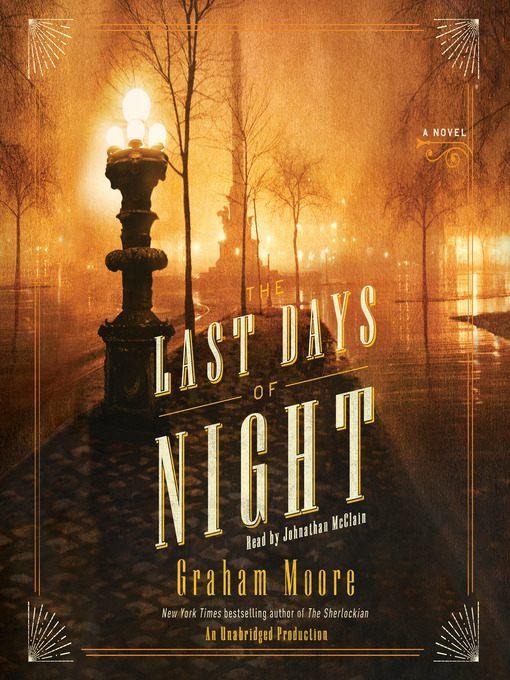
The Last Days of Night
A Novel
کتاب های مرتبط
- اطلاعات
- نقد و بررسی
- دیدگاه کاربران
نقد و بررسی

July 18, 2016
Moore (The Sherlockian), again turning to historical events for the basis of a thrilling plot, tackles the “war of the currents,” which pitted Thomas Edison against George Westinghouse in a turn-of-the-century New York legal battle. Fresh out of Columbia Law School, Paul Cravath is trained in research and dealing with concrete facts; he is not used to being at the center of a billion-dollar lawsuit, but that is exactly where he finds himself after agreeing to work with George Westinghouse. The two inventors become locked in a back-and-forth legal dispute after Thomas Edison claims he invented the light bulb and sues Westinghouse, who then issues a countersuit against Edison for violating Westinghouse’s own patent. At the heart of the matter is determining who invented the light bulb and whether or not the patent covers all forms of the bulb. Paul hopes to win the case by enlisting the help of Nikola Tesla, but that proves to be a much more unruly prospect than he initially expected, as the eccentric man agrees to help but brings with him new challenges. Amid the bickering of the iconic characters, Paul ends up emerging as the emotional center, trying to hold strands of the case together and stay true to his own moral standards. While the plot starts off slowly, the tempo picks up as events within the court begin to unfold. Moore’s extensive research is apparent, and readers are likely to walk away from the book feeling as informed as they are entertained.

October 31, 2016
Moore makes fictional use of the real-life events that occurred in the late 1880s, when Thomas Edison and George Westinghouse locked financial horns in an all-out billion-dollar New York courtroom war over who invented the electric lightbulb. The novel’s protagonist is another historical figure, attorney Paul Cravath, who, fresh out of Columbia Law School, was tapped by the wealthy and powerful Westinghouse to defend him against Edison’s suit. Moore’s writing makes the mogul’s surprising decision seem entirely credible, and reader McClain’s vocal interpretations—Cravath as youthful but cocky, and Westinghouse as gruffly realistic, but subtly impressed—add much to that credibility. For Edison, the book’s antagonist, McClain uses a crisp, to-the-point delivery that carries a hint of mockery and more than a hint of threat. As the novel and the legal battle progress, marked by courtroom twists, electrocutions, fires, attempted murder, and hairbreadth escapes, Cravath meets a series of fascinating, fully crafted characters, all of whom are provided appropriate voice. But McClain’s talent is best on display when speaking for the maddeningly eccentric Nikola Tesla. The genius inventor who yammers away in a Serbian accent that sounds authentic and is mostly understandable, constantly shifting emotional gears from sarcasm to truculence to self-aggrandizement to, finally, genuine warmth and fondness toward Cravath. Quite a performance. A Random House hardcover.

Who would have thought that the race to produce a workable light bulb could serve as the basis of a gripping historical novel? The story of the late-nineteenth-century battle between Thomas Edison and George Westinghouse, as narrated by Johnathan McClain, is the best kind of can't-turn-it-off listen. Coils, wires, direct and alternating current, and the strange inventor Nikola Tesla are the stuff of marvelous intrigue as Westinghouse's lawyer, Paul Cravath, battles Edison's threats. McClain, whose Cravath has an enthusiastic mid-American persona, creates equally imaginative vocal portraits of Edison, Westinghouse, and Tesla, and believably colors several different women. Nicely marrying his pace and tone to each scene, and offering an easy narrative voice, McClain creates a superb audio experience. A.C.S. Winner of AudioFile Earphones Award � AudioFile 2016, Portland, Maine

























دیدگاه کاربران